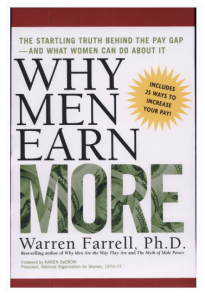INTRODUCTION
NCFM formed in 1977 to address men’s issues. Since that time, a men’s rights movement has been steadily growing globally to address men’s rights that have been seriously neglected in laws and public policies worldwide. Men have been systematically discriminated against in parenting rights, child custody, criminal entencing, military conscription, education, domestic and sexual violence laws that neglect male victims and support false accusations, reproductive rights, genital integrity laws, international forced labor laws, public benefits and more, while men and boys face societal misandry and male bashing. Men make 80-99% of homeless adults, job deaths and injuries, incercarated persons, combat deaths, dropouts and suicide deaths (“attempted” suicide rates are unreliable because it is unlikely men report failed suicides as often as women do). Men also die younger than women and have higher mortality rates for 13 of the 15 leading causes of death. But instead of hearing about these disparities we relentlessly hear about gender disparities at the top of society (government officials, CEOs), which exist mainly due to expectation gaps (women still seek men who can be primary breadwinners) and because women have more options than men to be the primary parent, an option most women choose. The so-called “pay gap” is only a snapshot of average yearly full-time salaries, which does not account for overtime (90% male), commute distances, work flexibility, and numerous life choices, which, according to a recent study by the U.S. Department of Labor, are more likely the causes of the pay gap than discrimination. The fact that men make the majority of elected officials and business owners does not mean men’s issues are adequately addressed. That is what Warren Farrell aptly calls “the myth of male power.” (See “The Myth of Male Power; Why Men Are The Disposable Sex” by Warren Farrell, Ph.D.)

Most teachers are women. Nothing is being done to change that imbalance. Many modern educational practices are counterproductive for boys. Success in school is tightly correlated with the ability to sit still, be quiet, and complete paperwork. Many young boys are bodily kinesthetic learners who respond to hands-on lessons. The educational establishment finds this...
Read more »
Tags: discrimination against boys, discrimination against men], discrimination in education, don't shoot the women, education, gender discrimination, national coalition for men, national coalition of free men', ncfm, obama, ritalin, schools, sex discrimination, title ix, title nine
Posted in Issues | 11 Comments »
Updated April 2011 ALPHA PHI ALPHA Black fraternity wants White House Council on Men and Boys AUSTRALIA Australian Men’s Rights Agency ENGLAND Meanwhile British Men Finally Get Their Say INDIA Harassed men, kin to hit streets Divorce Rights Unite Husbands ‘Harrassed” Husbands Plan Struggle Against Biased Laws Boys Fight for Freedom Now, is That Malevolence? Mens...
Read more »
Tags: child abuse, child support, children rights, children's rights, dad rights, dad's rights, divorce, domestic violence, dowery fraud, father rights, father's rights, malta, mens movement, mens rights, mens rights movement, moraco, national coalition for men, paternity fraud, universities
Posted in Issues | 22 Comments »

The media has repeatedly publicized studies that purportedly found men do not do their share of housework. These studies, including one by the United Nations, were seriously flawed as they did not account for work outside the home and/or failed to factor many traditionally male forms of housework. The mass media also virtually ignored subsequent...
Read more »
Tags: discrimination against men], feminist myth, gender myth, housework, man doing housework, men work at home
Posted in Issues | 46 Comments »

The male foreskin is a highly innervated erogenous organ that is dense with specialized mucosa and over 20,000 high sensory nerve endings. It acts as a natural buffer and lubricant during sex. Researchers using fine-touch medical instruments shows it is the most sensitive part of the penis. That might explain why a recent...
Read more »
Tags: castration, circum, discrimination against men], foreskin, genital integrety, mens health, national coalition for men, ncfm
Posted in Issues | 42 Comments »

Despite gains made by women the pay gap continues to be used in misleading ways to advance public policy agendas without fully explaining the reasons behind the pay gap. Here, you will find a good starting place for understanding “pay gap” misleading information and why it continues to be used by Power Elite Feminists to push their agendas....
Read more »
Tags: discrimination against men], equal wages, feminist myths, feminst lies, maternity leave, national coalition for men, ncfm, paternity leave, pay gap, sexism, spin, unequal wages, wages, warren farrell, why men earn less, why men earn more, why women earn less, why women earn more
Posted in Issues | 35 Comments »

Historically, many rape laws excluded male victims from the protections women receive. The Model Penal Code, for example, defined “rape” so that only women could be victims. In England, funding for sex abuse victims is often denied for male victims regardless of how devastating. The federal government spent hundreds of thousands of dollars studying rapes on college campuses...
Read more »
Tags: abused men, discrimination against men], gender discrimination, male rape, mens health, national coalition for men, ncfm, rape, sexism, sexual assault
Posted in Issues, Uncategorized | 17 Comments »

For years, the Forced Labour Convention of 1930 exempted “able-bodied males” between ages 18 and 45 from the ban on slavery and forced labor. See Article 11. And although the exemption was eventually eliminated, Article 2 still exempts prisoners and soldiers (90+% male). Male slaves are frequently ignored by human rights laws and policies. For example,...
Read more »
Tags: discrimination against men], gender discrimination, human trafficing, human trafficking, indentured servitude, national coalition for men, ncfm, sex discrimination, sexism, slavery, slaves
Posted in Issues | 3 Comments »

Research has repeatedly shown that men get higher criminal sentences than women even when all other factors are accounted for. See also, Seattle Times, “State courts unfair to men, minorities, UW study suggests,” This confirms prior data showing men receive higher sentences than women for the same crime even when age, race, priors, family situation, and other factors are accounted...
Read more »
Tags: boys health, discrimination against men], disparate sentencing, gender discrimination, incarceration, jail, national coalition for men, ncfm, prison, sentencing, sex discrimination
Posted in Issues | 25 Comments »

Fathers have historically been denied equal parenting rights with mothers. The 19th Century “tender years” doctrine, which explicitly gave mothers custody over children ages 13 and younger, was later replaced with the “best interests of the child” doctrine, but the gender bias persisted. As late as 1971, the Minnesota State Bar Association’s handbook advised lawyers and judges that “except in very...
Read more »
Tags: boys health, child custody, child support, choice for men, dads, discrimination against men], fatherhood, gender discrimination, marc angelucci, mens health, national coalition for men, ncfm, parenting, paternity fraud, sexism
Posted in Issues | 38 Comments »

Men’s reproductive rights include issues such as false paternity claims or paternity fraud, adoption rights, abortion, rights over frozen embryos, choice for men, etc. The American Association of Blood Banks reports that, out of 300,000 DNA paternity tests performed annually, 30% exclude the man as the biological dad. Over 70% of paternity judgments in...
Read more »
Tags: california mens centers, carnel smith, child custody, child support, choice for men, choice for women, harry crouch, marc angelucci, paternity, paternity fraud, reproductive rights, sex discrimination
Posted in Issues | 87 Comments »


























